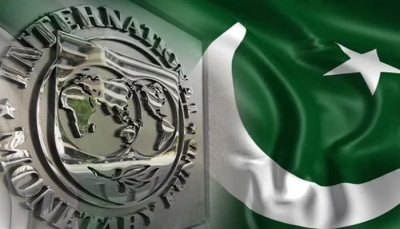Islamabad: In an unusual move, the IMF Tuesday urged Pakistan to resolve its political disputes in line with the “Constitution and rule of law.”
The remarks by IMF Mission Chief to Pakistan Nathan Porter came after Prime Minister Shehbaz Sharif contacted the chief of the Washington-based lender to revive the much-awaited $ 6.5 billion bailout package in a last-ditch effort to avoid a possible default.
Cash-strapped Pakistan and the IMF have failed to reach a staff-level agreement on the much-needed $ 1.1 billion bailout package aimed at preventing the country from going bankrupt.
The funds are part of a $ 6.5 billion bailout package the IMF approved in 2019, which analysts say is critical if Pakistan is to avoid defaulting on external debt obligations.
Prime Minister Sharif and International Monetary Fund (IMF) Managing Director Kristalina Georgieva took place Saturday after the government could not break the deadlock, according to The Express Tribune newspaper.
“We take note of the recent political developments, and while we do not comment on domestic politics, we do hope that a peaceful way forward is found in line with the Constitution and rule of law,” IMF Mission Chief to Pakistan Nathan Porter said, days after Sharif met Georgieva.
May 9, violent protests erupted after paramilitary Rangers arrested former prime minister Imran Khan from the Islamabad High Court premises in connection with a corruption case.
His Pakistan Tehreek-e-Insaf (PTI) party workers vandalised a dozen military installations, including the Lahore Corps Commander House, the Mianwali airbase and the ISI building in Faisalabad in response to his arrest.
The mob also stormed the Army headquarters (GHQ) in Rawalpindi for the first time.
Thousands of Khan’s supporters were arrested following the violence that the powerful Army described as a “dark day” in the history of the country.
Prime Minister Sharif said Tuesday that his government was unwilling to talk with Khan’s party due to its nation-wide violent riots May 9.
The IMF usually refrains from commenting on another country’s political affairs.
“Sustaining strong policies and obtaining sufficient financing from partners remain key for Pakistan to maintain macroeconomic stability,” Porter said.
He noted that the IMF staff continues engagement with the Pakistani authorities to pave the way for a board meeting before the current programme expires by the end of June.
Porter also elaborated on the conditions Pakistan has to meet to reach an agreement with the foreign lender.
These include arranging foreign loans, approval of a new budget in line with the IMF framework, and restoration of the foreign exchange market’s proper functioning.
In February this year, IMF officials and the Pakistan government held discussions, which remained inconclusive.
Pakistan, currently in the throes of a major economic crisis, is grappling with high external debt, a weak local currency and dwindling foreign exchange reserves enough to shore up for barely one month’s imports.
Pakistan’s inflation level rose by a whopping 36.4 per cent in the year in April, driven mainly by food prices.
This is the highest in South Asia, and up from 35.4 per cent in March, according to the country’s statistics bureau.
Meanwhile, the rupee traded at Rs 285.41 in the interbank market Monday.
PTI






































